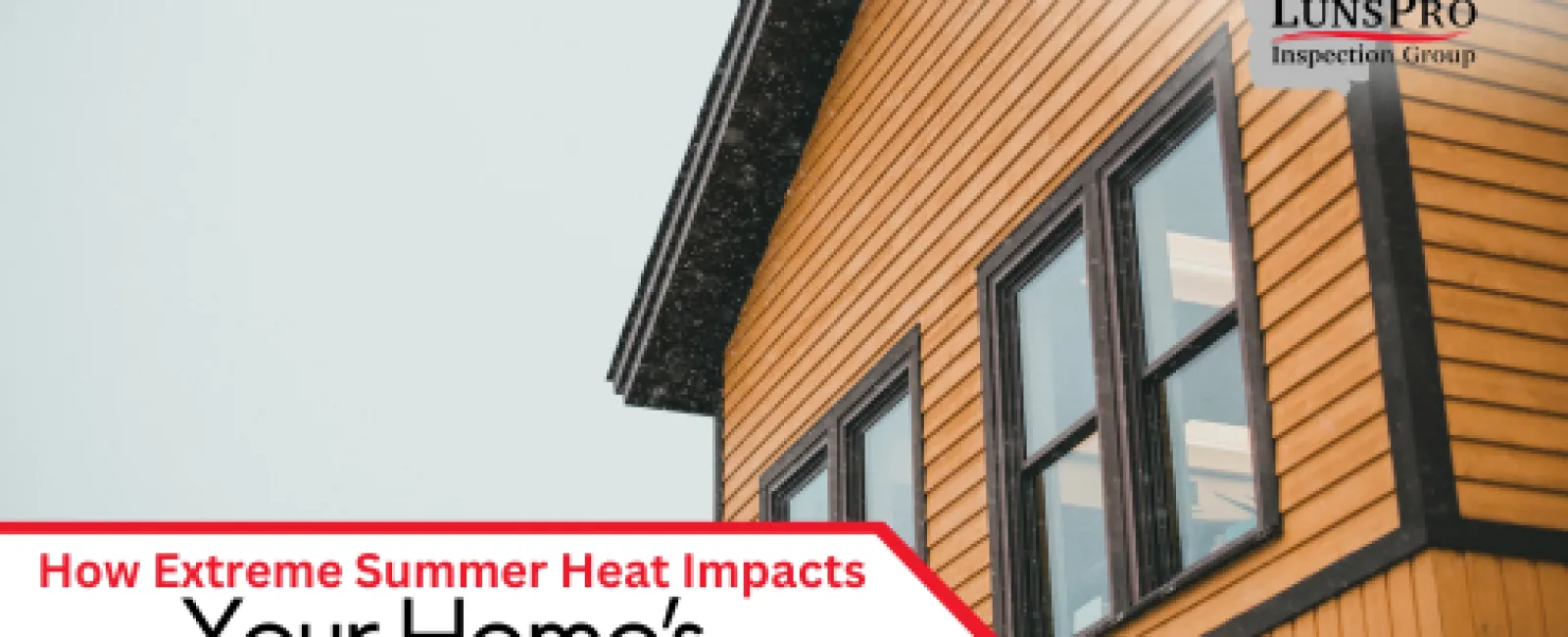Summers in Georgia are becoming increasingly intense, with prolonged heatwaves, dry spells, and rising temperatures becoming the norm. While it may be tempting to focus solely on keeping cool indoors, many homeowners overlook a significant concern—how extreme summer heat can impact the structure and systems of your home. From shifting foundations to HVAC strain, the long-term consequences of unchecked heat exposure can be serious, costly, and even hazardous.
For homeowners in Atlanta, Alpharetta, and Athens, understanding how high heat levels affect different parts of a home is essential. The Metro Areas are known for their diverse soil types, aging infrastructure, and seasonal weather swings, making properties especially vulnerable during the summer. Whether you're living in a historic bungalow or a newer development, it's important to stay ahead of potential damage through regular assessments like those offered by LunsPro Inspection Group, a trusted name in Georgia home inspections.
1. Foundation Problems Caused by Heat
One of the most critical concerns for homeowners during the summer is foundation stability. Extreme heat can cause soil shrinkage, particularly in areas with clay-heavy soils, which are common in Georgia. As the ground dries out, it contracts and pulls away from your home's foundation, leading to settling, cracking, and even shifting of structural components.
Warning Signs of Foundation Stress:
Cracks in walls, floors, or ceilings
Doors and windows that stick or won't close properly
Gaps between walls and floors
Sloped or uneven flooring
If you observe any of these symptoms, it may be time to schedule a professional assessment. The expert team at LunsPro Inspection Group provides thorough Atlanta, Alpharetta, and Athens Residential and Commercial Inspections that include foundation evaluations, helping homeowners identify and address issues before they escalate.
2. Roof Integrity Under Intense Heat
Roofing materials absorb a tremendous amount of solar radiation during the summer. Prolonged heat exposure can lead to thermal expansion and contraction, causing shingles to curl, blister, or crack. For asphalt roofs, high temperatures accelerate the breakdown of protective granules, shortening the roof's lifespan.
Heat-Related Roof Issues:
Premature aging of shingles
Warping of underlayment or sheathing
Leaks due to deteriorated flashing
Increased energy bills due to reduced insulation effectiveness
A roof inspection as part of a Georgia home inspection can pinpoint early signs of damage. Homeowners in the Metro Areas should be particularly cautious if their roof is older than 15 years or has had recent repairs, as heat stress could accelerate wear and tear.
3. Attic Ventilation and Insulation Breakdown
Another hidden threat from summer heat is inadequate attic ventilation and insulation. Without proper airflow, attic temperatures can soar well above 130°F, compromising structural components and putting extra load on HVAC systems.
Consequences of Poor Attic Conditions:
Warped rafters and joists
Mold and mildew from trapped moisture
Heat transfer into living areas
Increased cooling costs
LunsPro Inspection Group offers in-depth evaluations of attic conditions during their Atlanta, Alpharetta, and Athens Residential and Commercial Inspections. For homeowners throughout the Metro Areas, addressing attic issues early can mean the difference between a manageable upgrade and costly repairs.
4. Exterior Cracking and Fading
Summer heat can also damage the exterior elements of a home, including siding, paint, and masonry. High UV exposure degrades paint and sealants, while fluctuating temperatures can lead to expansion and contraction cycles that cause surface cracks.
Look Out For:
Faded or peeling paint
Cracks in brick, stucco, or siding
Warped vinyl panels
Gaps in caulking around windows and doors
These exterior signs may seem cosmetic at first, but they often signal deeper structural or water intrusion issues. Regular Georgia home inspections ensure that minor issues are caught early before they compromise the home's envelope.
5. Plumbing System Strain
The summer heat can impact your plumbing system, particularly pipes located in crawl spaces, attics, or exterior walls. High temperatures can cause pipe materials to expand, potentially leading to leaks or bursts when the materials contract again. In addition, increased water usage during the summer—especially in households with irrigation systems or pools—puts added pressure on plumbing.
Common Summer Plumbing Issues:
Pipe leaks due to expansion/contraction
Low water pressure
Sewer line backups from dried-out soil causing shifting
Overworked water heaters
The LunsPro Inspection Group team offers plumbing evaluations as part of their comprehensive Georgia home inspections, helping homeowners stay proactive with their plumbing maintenance during high-heat periods.
6. Electrical System Overload
Summer brings increased demand for electricity due to extended air conditioning usage and the operation of fans, refrigerators, pool pumps, and more. Homes with outdated or underpowered electrical systems may struggle to keep up, creating both safety hazards and inefficiencies.
Risks of Electrical Overload:
Circuit breaker trips or blown fuses
Overheating wires
Fire hazards from overloaded panels
Reduced lifespan of appliances and electronics
If your electrical system is showing signs of stress, or if your home is more than 20 years old, a thorough inspection by LunsPro Inspection Group can help identify necessary upgrades or repairs.
7. HVAC System Wear and Tear
Arguably the most overworked system in your home during the summer is your HVAC. Consistent high temperatures force air conditioning systems to work overtime, which can lead to accelerated wear, refrigerant leaks, clogged filters, and even system failure.
Signs Your HVAC Is Under Stress:
Unusual noises
Uneven cooling
High energy bills
Short cycling
Routine HVAC maintenance is essential, but it's also wise to have the system reviewed during a Georgia home inspection, especially if you suspect any inefficiencies. In the Atlanta, Alpharetta, and Athens areas, summers can stretch well into September, meaning prolonged strain on cooling systems.
8. Crawl Space and Basement Vulnerabilities
Heat and dryness can also cause soil shrinkage beneath crawl spaces or basements, potentially resulting in shifts, cracks, or increased moisture intrusion when rain returns. Many homes in the Metro Areas are built on crawl space foundations, which are highly susceptible to ventilation and humidity issues.
Crawl Space Red Flags:
Sagging floors
High humidity levels
Mold growth
Pest infestations
LunsPro Inspection Group includes crawl space evaluations as a standard part of their Georgia home inspections, giving homeowners peace of mind that this often-overlooked area is thoroughly checked for summer-related stress.
Extreme summer heat is more than just an inconvenience—it can pose a serious threat to your home's structural integrity and essential systems. Foundation cracks, roof damage, electrical overloads, and HVAC strain are just a few of the many ways that persistent heat can compromise your home. Homeowners in Atlanta, Alpharetta, and Athens must remain proactive and aware, especially given the regional climate patterns unique to the Metro Areas.
The good news is that you don't have to face these challenges alone. With the help of a trusted inspection partner like LunsPro Inspection Group, you can identify heat-related vulnerabilities early and take action before they become major repairs. Their expertise in Atlanta, Alpharetta, and Athens Residential and Commercial Inspections ensures your home is fully evaluated with precision and care.
Whether you're concerned about your foundation, roofing, plumbing, or HVAC system, scheduling a comprehensive Georgia home inspection is one of the smartest decisions you can make. Protect your investment, maintain your comfort, and ensure your home weathers every season—especially the scorching Georgia summers—with confidence.

